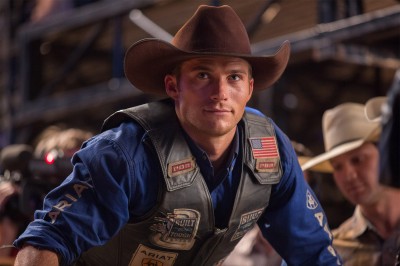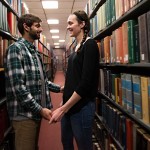
The titular longest ride of the newest Nicholas Sparks-adapted romance flick “The Longest Ride” was sitting through the film and attempting to digest its story. Directed by George Tillman Jr., the film’s sappy, romantic drama focuses on an “unlikely” blossoming love, and an unlikely friendship between one lover and an elderly man with a similar story. If the characters didn’t hammer in expected clichés, the dialogue surely did.
Within the first few minutes, we are introduced to our two main characters. We find the extremely blonde Sophia (Britt Robertson) and the rugged Luke (Scott Eastwood) cross paths outside of a bar. Camera angles and shots of them thoughtfully looking off into the distance of the night try to convince you these two are loners, misunderstood, perhaps even outsiders. You just might just believe it too, if they weren’t standing five feet away from a bar.
In the proceeding scenes, we nonetheless watch as one cliché brings in the next. Their first conversation establishes their respective stereotypes: clumsy girl who is frustratingly blind to her obvious beauty, rugged and squinty-eyed gentleman who enjoys old-school gender roles. College girl meets country boy, northern culture meets southern gentility. “My oh my! What will happen next?” asks nobody.
But alas, these lovers are interrupted by the sorority girl’s drunk and soon-to-be-puking friend. Numbers are exchanged, she offers to call, but bull-man must make the first call in order to protect his manhood. Cookie-cutter young romance ensues.
And if we continue to watch, we see the visualization of an early days Taylor Swift song play out before us — but with a twist. Finally, we see the stakes, the small issue that will make tying this business up neatly with a little red bow harder than we thought. Sophia is moving to New York to pursue her passion for art, leaving cowboy to become the sadboy. Of course, it starts raining in order to emphasize the obvious tragedy of this news.
On their dark and gloomy ride home from that fateful episode, they find an old man (Alan Alda) in a car accident slowly dying in his car engulfed in flames. So naturally, they save his life (on their first date, no less). After Luke exits, Sophia strikes up an unlikely friendship with the recovering old man, Ira.
We are nearly saved by his character. On the surface, he seems relatable and snarky. For a moment, it seems that he will bring a degree of authenticity and true human nature to the screen, but any hope of that is drowned by the sappy love letters that Sophia pulls from his burning car.
We’re teased by the potential for artistry by the parallel drawn between the love letter’s old story and the story between our two modern lovers. The story within the letters becomes the most authentic part of the movie and is likely what will keep people enduring this ordeal. A small taste of true relationship struggles and a glimpse of wisdom come through in this framed story, along with what appears to be the message of the film — true love is sacrifice.
What in turns happens proves to be the exact opposite. The unrealistic characters faced with realistic circumstances revert back into the fairytale everyone was expecting. Neither character — not Luke nor Sophia — is forced to give up anything of importance, and the “love prevails over all odds” message is once again beat into our minds like a kick from an angry horse.














